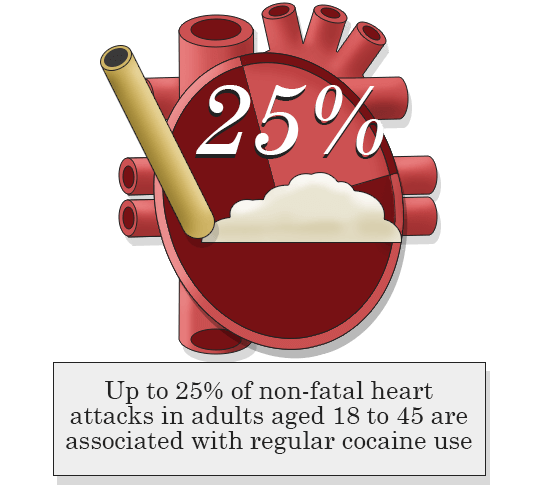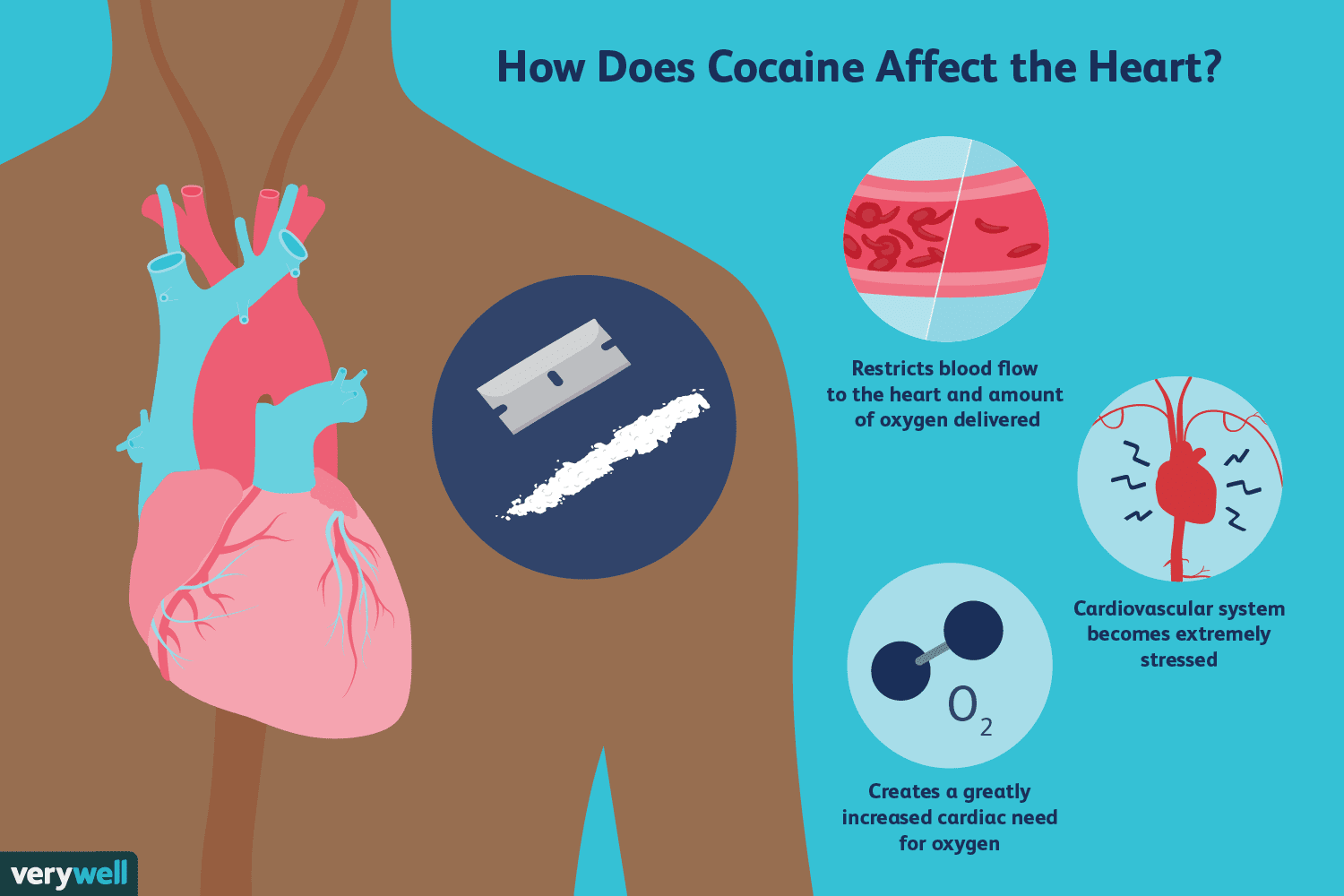What effects does cocaine have on the heart?
Cocaine is a potent drug that stimulates the central nervous system, causing a euphoric high. It also causes blood pressure and heart rate to increase, and it disrupts the heart’s electrical signals.
These effects to the heart and cardiovascular system increase a person’s risk for heart-related health issues, including a heart attack. Indeed, Australian researchers first used the phrase “the perfect heart-attack drug” in research they presented to the American Heart Association’s Scientific Sessions in 2012.
The risks to your heart and cardiovascular system don’t only come after years of cocaine use; the effects of cocaine are so immediate on your body that you could experience a heart attack with your first dose.
Cocaine was the leading cause of drug abuse-related visits to emergency departments (ED) in 2009. (Opioids are the leading cause of drug-related ED visits more recently.) Most of these cocaine-related visits were due to cardiovascular complaints, such as chest pain and racing heart, according to a 2014 study.
Let’s take a closer look at how cocaine affects the body and why it’s so dangerous to your heart health.
Cocaine’s effects on heart health
Cocaine is a fast-acting drug, and it causes several types of adverse effects on the body. Here are some of the effects the drug can have on your heart and blood vessels.
Blood pressure
Soon after cocaine is ingested, your heart will begin to beat faster. At the same time, cocaine narrows your body’s capillaries and blood vessels.
This puts a higher degree of stress, or pressure, on your vascular system, and your heart is forced to pump harder to move blood through your body. Your blood pressure will increase as a result.
Hardening of arteries
Cocaine use may lead to the hardening of arteries and capillaries. This condition, called atherosclerosis, isn’t immediately noticeable, but the short- and long-term damage caused by it can lead to heart disease and other potentially life-threatening issues.
In fact, 28 percent of people who died suddenly after cocaine use showed severe atherosclerosis-related coronary artery disease.
Aortic dissection
The abrupt increase in pressure and extra stress on the heart muscle can lead to a sudden tear in the wall of your aorta, the main artery in your body. This is called an aortic dissection (AD).
An AD can be painful and life-threatening. It requires immediate medical treatment. Older studies have shown that cocaine use was a factor in up to 9.8 percent of AD cases.
Inflammation of the heart muscle
Cocaine use can cause inflammation in the layers of your heart’s muscles. Over time, the inflammation can lead to muscle hardening. This can make your heart less efficient at pumping blood, and it can lead to life-threatening complications, including heart failure.
Heart rhythm disturbances
Cocaine can interfere with your heart’s electrical system and disrupt the signals that tell each portion of your heart to pump in sync with the others. This can lead to arrhythmias, or an irregular heartbeat.
Cocaine-induced heart attacks
The variety of effects on the heart and blood vessels from cocaine use increase the risk for a heart attack. Cocaine can cause increased blood pressure, stiff arteries, and thickened heart muscle walls, which can lead to a heart attack.
A 2012 study of recreational cocaine users found that their hearts’ health showed significant impairment. They averaged 30 to 35 percent greater aortic stiffening and higher blood pressure than non-cocaine users.
They also had an 18 percent increase in thickness of their heart’s left ventricle. These factors are linked to a higher risk for heart attack or stroke.
A 2014 study found that regular cocaine use was associated with an increased risk of premature death. However, this study didn’t link the early deaths to cardiovascular-related death.
That being said, a 2018 study found that 4.7 percent of adults under age 50 had used cocaine at the time of their first heart attack.
What’s more, cocaine and/or marijuana was present in 1 in 10 people who had heart attacks under age 50. The use of these drugs significantly increased an individual’s risk for cardiovascular-related death.
Cocaine-induced heart attacks are not just a risk for individuals who’ve used the drug for years. In fact, a first-time user can experience a cocaine-induced heart attack.
Cocaine use quadruples sudden death in users 15–49 years of age, due primarily to resulting cardiovascular disease.
Symptoms of cocaine-related heart problems
Cocaine use can cause immediate heart-related symptoms. These include increased heart rate, sweating, and palpitations. Chest pain can occur, too. This may lead individuals to seek treatment at a hospital or emergency room.
The most significant damage to the heart, however, may be occurring silently. This lasting damage may be difficult to detect. A 2011 study found that medical tests rarely show damage to a cocaine user’s blood vessels or heart.
A cardiovascular magnetic resonance (CMR)test can detect the damage. CMRs performed in people who’ve used cocaine show excess fluid on the heart, muscle stiffening and thickening, and changes to the motion of the heart’s walls. Traditional exams may not show many of these symptoms.
An electrocardiogram (ECG)can also detect silent damage in the hearts of people who’ve used cocaine. An ECG study in cocaine users found that the average resting heart rate is significantly lower in people who’ve used cocaine compared to people who’ve not used the drug.
Also, this same study found that an ECG shows cocaine users have more severe bradycardia, or abnormally slow pumping. The severity of the condition is worse the longer a person uses cocaine.
Treatment of cocaine-related heart problems
Most treatments for cocaine-related cardiovascular issues are the same as what’s used in people who haven’t used the drug. However, cocaine use does complicate some cardiovascular therapies.
For example, people who’ve used cocaine cannot take beta blockers. This type of critical medication works to lower blood pressure by blocking the effects of the hormone adrenaline. Blocking adrenaline slows the heart rate and allows the heart to pump less forcefully.
In individuals who’ve used cocaine, beta blockers may actually lead to greater blood vessel constriction, which can increase blood pressure even more.
Your doctor may also be reluctant to use a stent in your heart if you do have a heart attack because it can increase your risk for blood clotting. At the same time, your doctor may be unable to use clot-busting medication if a clot does form.
Getting help for cocaine use
Regular cocaine use increases your risk of a heart attack and stroke. That’s because cocaine can cause damage to your heart almost immediately after you begin using it, and the damage builds the longer you use the drug.
Quitting cocaine doesn’t immediately reduce your risk for cardiovascular health problems, since much of the damage can be permanent. However, quitting cocaine can prevent further damage, which reduces your risk for heart-related health issues, such as a heart attack.
If you’re a frequent cocaine user, or even if you only use it occasionally, seeking professional help may benefit you. Cocaine is a highly addictive drug. Repeated use can lead to dependence, even addiction. Your body may become accustomed to the effects of the drug, which may make withdrawals more difficult.
Talk with your doctor about finding help to quit the drug. Your doctor may refer you to a substance abuse counselor or a rehabilitation facility. These organizations and people can help you overcome withdrawals and learn to cope without the drug.
The takeaway
If you have used or still use cocaine, you can find help to quit. The drug is potent and powerful, and withdrawal from it can be difficult.
However, quitting is the only way to stop the damage that the drug does, mostly silently, to your body’s organs. Quitting can also help extended your life expectancy, giving you back decades you may lose if you continue to use the drug.
https://www.healthline.com/health/cocaine-heart-attack#The-takeaway
More information here:
The evidence for ibogaine: What new studies tell us about ibogaine for addiction treatment Over twenty years ago, former heroin addict and scientist Howard Lotsof filed a series of patents for something he called Endabuse, which he saw as a universal, accessible addiction treatment. This...

www.bluelight.org




